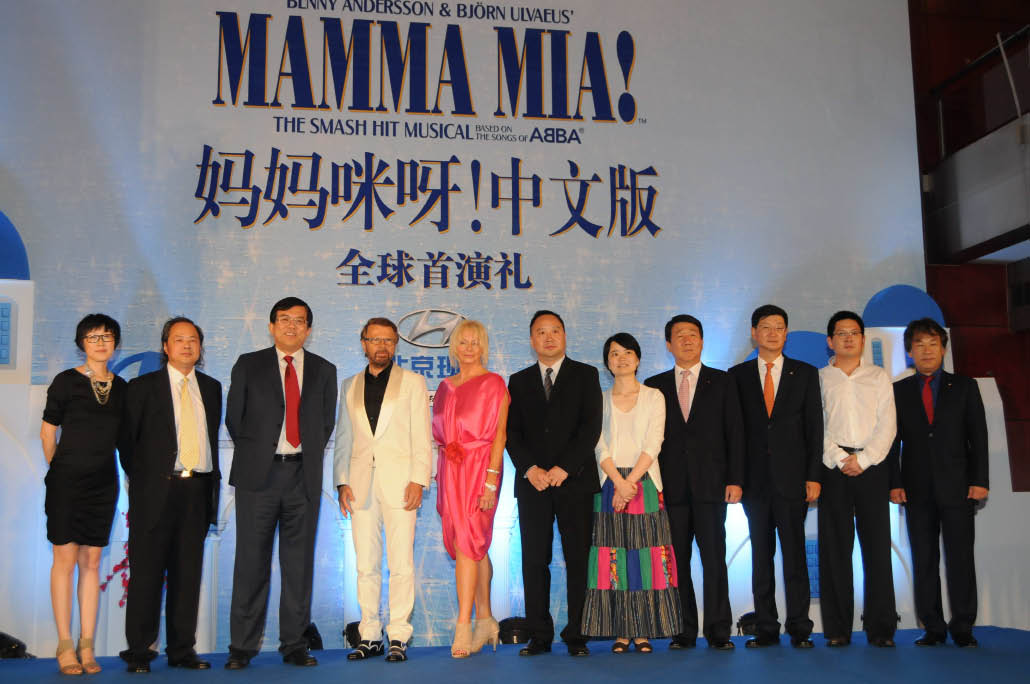Mamma Mia!The Making of a Chinese Hit
Mamma Mia!
The Making of a Chinese Hit
By TANG YUANKAI
THE Chinese version of the British smash-hit musical Mamma Mia! has swept Chinese theatergoers off their feet, or at least the enraptured faces of audience members leaving the theaters after witnessing the spectacle seem to suggest as much.
The Chinese version of Mamma Mia! is the 14th incarnation of the musical, succeeding the show's Italian, Japanese, German, Broadway and other reworkings. At the premiere in Shanghai in July 2011, a target of 200 performances was set by the show's producers. With half of these performances already under its belt, the show continues to enjoy wild popularity: audience numbers have already topped 150,000 and box-office receipts have passed RMB 45 million. It seems there will be no problems recovering production costs.
"Many people comment on the fact that the Chinese version of Mamma Mia! has been warmly received by domestic audiences, but what's on our mind at present is whether this test case will turn out to be a groundbreaking example of integrating Chinese musical theater with a world-class production," said Zhang Yu, president of the China Arts and Entertainment Group (CAEG), and one of sponsors of Mamma Mia! in China.
|
 |
| The Chinese version of Mama Mia! makes its debut in Shanghai on July 11, 2011. |
A Wild Success
According to Jin Fuzai, a renowned domestic composer and dean of the Musical Theater Department at the Shanghai Conservatory of Music, ordinary Chinese began to study musical theater as an art form in 1982, just a handful of years after the start of China's reform and opening-up. In those early years, musicals were mostly imported from abroad and performed by foreign casts.
In 2000 a team sent by musical master Andrew Lloyd Webber began investigating the potential in the Chinese market. It is said that one pessimistic director from the Shanghai Municipal Performance Company told this team that musicals could only maintain a run of about 10 performances in Shanghai. The next year, the Webber Musical Festival was kicked off at the Great Hall of the People in Beijing. It presented classic scenes from Webber's hit musicals to Chinese audiences for the first time, including scenes from Les Misérables, The Sound of Music and Cats; these shows went on to twice tour a dozen domestic cities. The Lion King in its turn had a run of 105 performances in Shanghai in 2007, setting a record for musical performances in China. These feats are testimonies to the huge potential in China's musical market.
Nevertheless, it was not until the debut of the Chinese version of Mamma Mia! that a Chinese team made its first attempt at purchasing a copyright and reproducing a classic musical. This marks an important milestone in the history of musical development in China.
For around three years CAEG had negotiated with the UK's Littlestar Corporation, owner of the copyright to Mamma Mia!. Littlestar set detailed and demanding requirements in the final agreement, even stipulating specifications for the toe rings of actresses and the size of the nails to be used in stage construction. The Chinese rendering of the original English script was required to be translated back into English by linguists and recorded for analysis. Finally, Bjorn Ulvaeus, composer of the ABBA songs on which Mamma Mia! is based, had the ultimate say in ensuring there were no misinterpretations of the original score's meaning and melody. This was all done to ensure a true representation of the original work.
"The creators of the Chinese Mamma Mia! aim to tap into the positive energy of Chinese audiences," remarked Zhou Zhiqiang, president of the National Theater of China (NTC). According to Zhou, the concept of putting the aesthetic involvement of the audience first is fundamental to creating an enjoyable and rewarding musical experience.
Casting Troubles
Audiences of Mamma Mia! in China see two actresses alternate in playing the heroine "Mamma." One is Tian Shui, an experienced actress and also deputy general manager of the Shanghai Dramatic Arts Center. The other is Ying Zi, a musical specialist who has performed on Broadway. Whilst both have extensive stage experience, their singing and acting abilities are regarded as not quite being at the level required of top-tier performers on the international stage.
Nationwide auditions for the Chinese cast followed international best practices, with a British creative team making the final casting decisions. Auditioning was by no means smooth sailing, however, and there was a dearth of eligible candidates for some roles. In one instance it was not until the very last minute that a suitable actress for the role of "daughter" was found. Zhang Fangyu, from Taiwan, was chosen for her "natural and naive smile."
It was only nine years ago that the Shanghai Conservatory of Music established its musical department, the first of its kind in China. This was soon followed by the introduction of musical programs at the Shanghai Academy of Drama, the Beijing Dance Academy and the Central Academy of Drama. While the estimated number of trained musical specialists in China is believed to exceed 1,000, many have changed professions, in part to pursue more stable, traditional career paths.
The cast of Mamma Mia! has gone through a rigorous rehearsal schedule, during which several cast members were forced out of the production owing to a lack of commitment to the process, and as a result several understudies were required on short notice to commit to multiple roles. After 50 days of intense training and a lot of blood, sweat and tears, Director Paul Garrington was quoted as saying that he was satisfied with the cast and that they had realized their potential. He revealed his initial skepticism as to whether the cast could adapt to this new style of performance, but that this skepticism proved unfounded.
Aside from casting issues, management and production links are also a crucial part of bringing a show to the stage. "We encountered a lack of technical and managerial talent for musicals on the Chinese mainland," says Tian Yuan, producer of Mamma Mia! China and general manager of United Asia Live Entertainment. She notes that an eligible candidate for the post of stage director finally emerged in Taiwan after half a year of searching.
Throughout the process, the Chinese crewmembers have been forced to learn the ropes as they go. "We have to become familiar with each link in the musical production chain, and in the process have developed a greater professionalism in our approach," says Zhang Yu. He indicated that the significance of purchasing the copyrights lies in that the local team would need to realize all links in the production chain using local talent. Owing to this first attempt, creating, producing and performing original Chinese musicals should be a much easier process in the future.
Step by Step
With a steady stream of foreign musicals and troupes being brought to China as inspiration, original Chinese musicals have recently begun to appear in greater numbers.
However, due to their inferiority to imported spectacles in aspects such as use of plot devices and musical scores, these domestic productions are failing to attract theatergoers in large numbers. "China's musical scene is still in its infancy," posits Zhang, and agrees with a number of Shanghai musical experts in suggesting the development of domestic musicals is following a three-stage process. First, classic foreign musicals are introduced, and this inspires audiences and writers alike. Second, Chinese versions of these classics are produced and performed under license agreements. In this process, the production chain for musicals is mastered and technical talent is developed. Finally, original Chinese musicals will eventually be brought to the stage and these creations will be promoted both in China and abroad. Certainly with Mamma Mia! China's musical scene is on its way to bigger things.
Services
Economy
- Eco-agriculture and Eco-tourism Power Nanchang’s Green Development
- Balance Environmental Protection and Economic Prosperity – Nanchang Looks to European Technology for Green Development
- Sustainable Growth Requires Wiser Energy Use
- Chinese Economy: On the Path of Scientific Development
- China's Economy over the Last Ten Years

